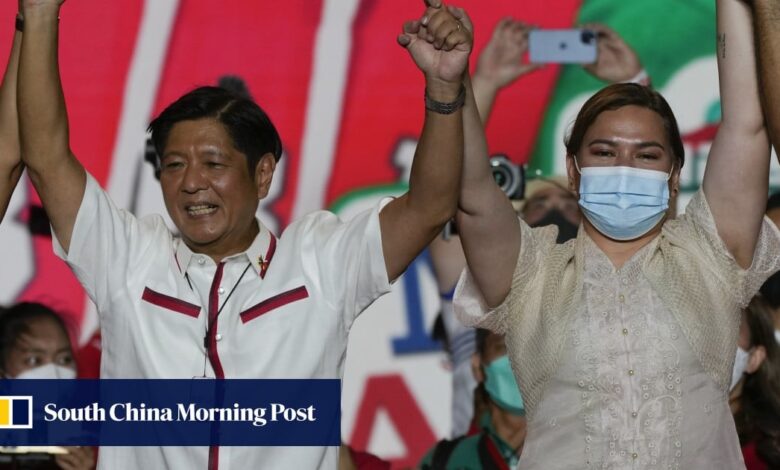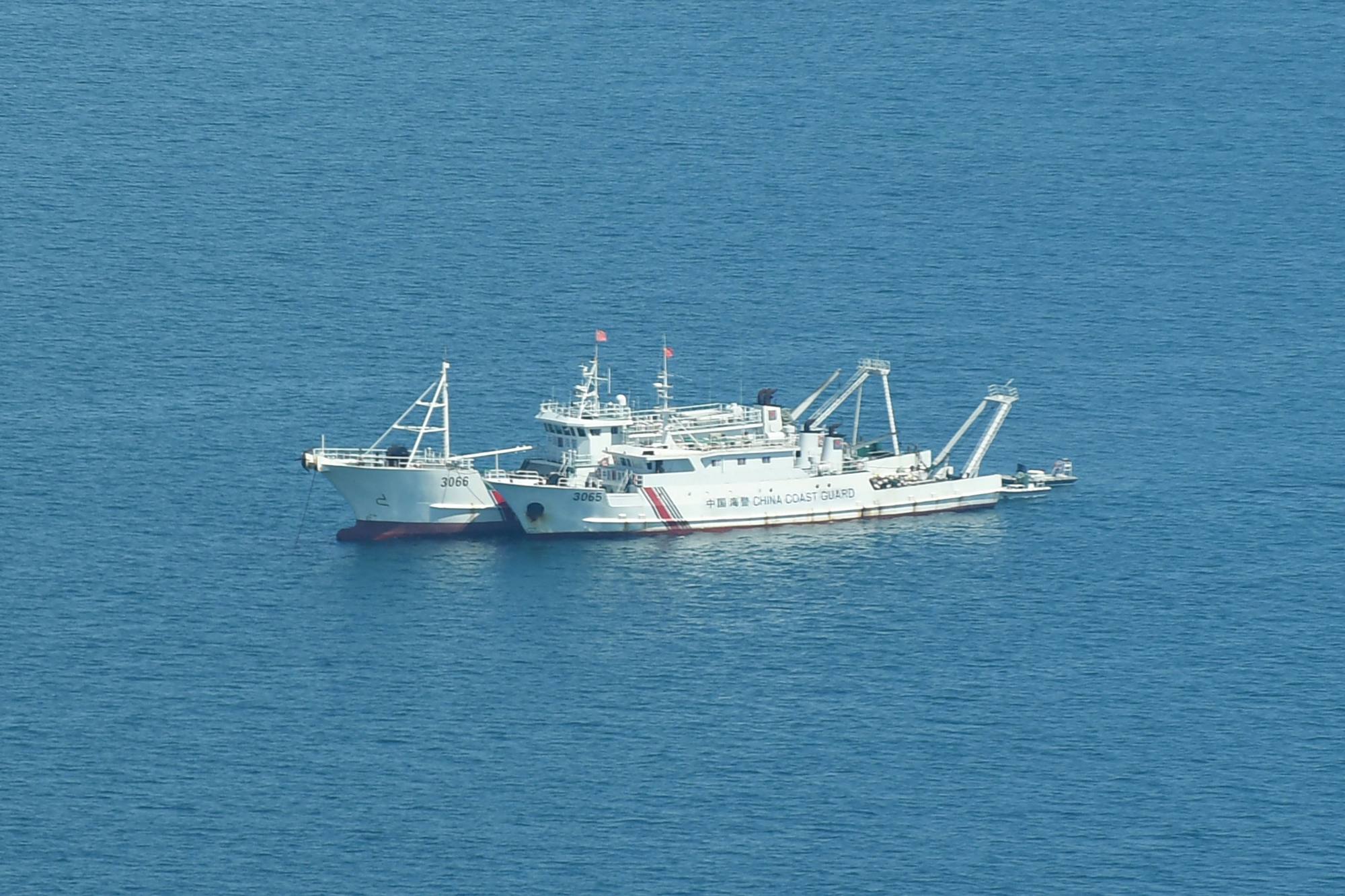Will Sara Duterte’s Beijing-friendly remarks blunt the Philippines’ South China Sea policy?

When Duterte-Carpio obtained the confidential funds for her office last year, she said the budget would be spent on tree planting, free transport and feeding programmes, among other areas.
Philippines will ‘stand our ground’ to South China Sea ‘bullying’: defence chief
Philippines will ‘stand our ground’ to South China Sea ‘bullying’: defence chief
Duterte-Carpio also wished for stronger bilateral ties in areas such as trade, science and technology, and people-to-people relations. “I take a particular interest in strengthening cooperation in the field of education and youth development,” she added.
The video prompted questions during a House debate on September 26, with Congressman Erwin Tulfo of the ACT-CIS Party-list, an ally of Marcos Jnr, issuing a disclaimer to say Duterte-Carpio’s message did not reflect the Philippine government’s official position on China.
The debate came as tensions between Manila and Beijing have escalated in recent months over their South China Sea dispute.
House representatives asked if the government was united in light of recent developments in the South China Sea. Tulfo was questioned by Kabataan Party-list representative Raoul Manuel on whether Duterte-Carpio’s message could be viewed as disloyal.
Unlike Duterte-Carpio, Marcos Jnr did not issue a congratulatory message to Beijing on China’s National Day, a further sign that the vice president and her superior may not be on the same page regarding the China issue.
On September 30, Marcos Jnr’s communications team posted a news release quoting international-studies professor Renato Cruz de Castro of De La Salle University in Manila, who praised the president for sending a “strong message to China” in decisively handling the Scarborough Shoal incident and “independent foreign policy”.
‘Always harassed’: the Filipino fishermen ensnared by South China Sea geopolitics
‘Always harassed’: the Filipino fishermen ensnared by South China Sea geopolitics
Marcos Jnr’s robust response to a flare-up in the maritime dispute with Beijing coincided with the decision by the House leadership last month to reallocate Duterte-Carpio’s confidential funds to state agencies tasked with keeping a close watch on China’s incursions in the West Philippine Sea.
Explaining the decision, Zaldy Co, chairman of the House Appropriations Committee that oversees the approval of the national budget said: “We will realign the confidential funds of various civilian agencies. Now is the time to give our intelligence community the means to perform their duties, especially in these pressing times when we’re facing serious concerns in the West Philippine Sea.
“The country’s safety and security are of paramount importance. To protect our territorial integrity from external threats, Congress is giving top priority to agencies directly in charge of protecting the country’s safety and securing its borders.”
The government bodies earmarked to receive the reallocated funds span the National Intelligence Coordinating Agency, the National Security Council, the Philippine Coast Guard and the Bureau of Fisheries and Aquatic Resources.
Filipinos pool supplies to spread Christmas cheer for South China Sea troops
Filipinos pool supplies to spread Christmas cheer for South China Sea troops
Arguing for more funding, coastguard spokesman Commodore Jay Tarriela told senators that the force, which defends the world’s fifth-longest coastline, had only received an intelligence budget of 10 million pesos (US$176,000) every year since 2009.
Diliman Jean Encinas-Franco, a political-science professor at the University of the Philippines, said the House had “caved in to pressure” in response to public anger over last year’s allocation by Marcos Jnr to Duterte-Carpio of an additional 125 million pesos (US$2.2 million) of confidential funds, which the VP spent in just 11 days.
On Wednesday, Duterte-Carpio spoke on the importance of confidential funds at a regional police office event in Butuan City, according to a report by ABS-CBN News.
“Peace and order, along with education, must be protected at all costs … Confidential funds play a vital role in maintaining security by providing the necessary resources to address unforeseen challenges swiftly and decisively,” Duterte-Carpio said.
“The allocation of confidential funds should not be constrained by time. It matters not whether it takes one day or one year of spending; what truly matters is the safety and security of our people,” she added.
In contrast, Congress did not allocate any confidential funds to the office of Leni Robredo when the opposition leader was vice-president last year.

Given the partnership between Marcos Jnr and Duterte-Carpio, the vice-president would have been able to tap the confidential funds in next year’s budget if not for the growing rift between her and the House leaders, Encinas-Franco said.
“The House leadership is not necessarily the VP’s ally but it’s too early to say if there is a power shift [against Duterte-Carpio],” the professor added.
Analysts have also pointed to differences between Duterte-Carpio and House Speaker Martin Romualdez, after the latter removed Gloria Macapagal Arroyo, a congresswoman and former president, as senior deputy speaker in May. Romualdez and his allies accused Arroyo – who brokered the alliance between Duterte-Carpio and Marcos Jnr – of plotting to take his place as speaker, to which Arroyo defended herself by saying there was a misunderstanding.
To protest against Arroyo’s removal, Duterte-Carpio resigned as chairman of Lakas-CMD, the dominant party in the House where Romualdez is president, saying her service to the country “cannot be poisoned by political toxicity or undermined by execrable political power play”.
In a Facebook message written in the Visayan language, Duterte-Carpio said without referring to any person: “In your ambition, do not be a tambaloslos.” She was referring to a mythical creature with a large mouth and male genitals from Visayan folklore known for misleading people.

The funding saga comes as speculation mounts over the ultimate political ambition of Duterte-Carpio and Romualdez.
When Duterte-Carpio chose to become Marcos Jnr’s running mate even though she outranked him in favourability ratings ahead of last year’s presidential poll, her supporters and the public had widely expected her to succeed him at the next election in 2028.
“Nothing must get in the way of her winning that presidency. Not a few believe that these confidential funds will find their way in Sara’s campaign kitty when she shoots for the country’s [highest] government post,” political commentator Antonio Montalvan II, who is also a social anthropologist, wrote in a column last month.
Romualdez is also rumoured to be considering a bid to succeed Marcos Jnr, who is his first cousin, as president.
For prospective presidential candidates, the budget they receive for next year could prove crucial ahead of the start of campaigning for elections in 2025 to select new mayors, governors, congressmen and Senate members for the country. If Duterte-Carpio and Romualdez were to consider a run for the presidency, political analysts say confidential funds and other forms of financing could help them push for their allies to get elected.
Duterte-Carpio could also face further scrutiny over the spending of last year’s 125 million pesos in confidential funds, retired Supreme Court justice Adolfo Azcuna told This Week in Asia.
The speed with which she spent the funds did not necessarily point to any irregularity but the procedures followed – from funding request to disbursement – should have complied with rules issued by the Commission on Audit, which has the power to introduce rules on the spending of public funds, Azcuna said.
Reallocating Duterte-Carpio’s 650 million pesos of confidential funds to other government agencies was also politically significant and “in a way, a slap” in the face, he added.





